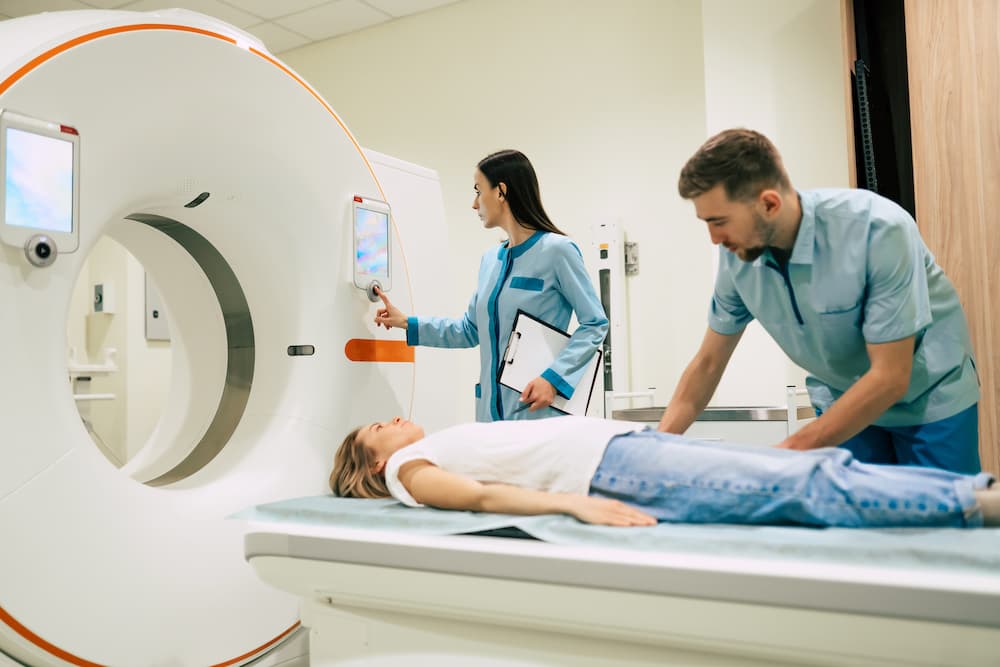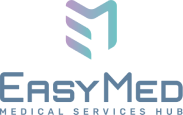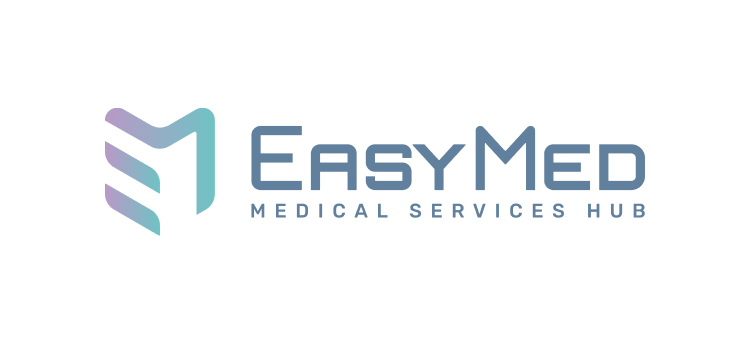
Positron emission tomography (PET-CT)
Positron emission tomography in combination with computed tomography (PET-CT) is one of the most advanced medical imaging techniques. This technique combines detailed CT images with functional PET information to comprehensively view the condition of internal organs and tissues. PET-CT is critically important for accurate diagnosis, allowing the detection and assessment of various diseases, including cancer, in the early stages.
Дополнительные процедуры:
PET-CT with EasyMed
EasyMed is your personal intermediary in the world of medical diagnostics. We are key in connecting patients with leading medical centers in Israel.
Our services include finding suitable clinics, scheduling procedures and accompanying clients at all stages – from the initial consultation to obtaining and interpreting the results.
Oncology diagnostics using PET-CT
PET-CT occupies a special place in the diagnosis of oncological diseases. This technique combines functional PET information, which tracks the metabolic activity of cells, with anatomical CT details, providing a complete and accurate image of the state of organs and tissues.
PET-CT effectively detects cancerous tumors by detecting even small changes at the cellular level. This is especially important for early cancer detection and assessment of its spread.
PET-CT in oncology is not just a diagnostic procedure; it is a comprehensive approach to understanding the nature of cancer in each patient’s body. This method provides important information that helps doctors fight the disease more effectively at all stages.
Application of PET-CT in oncology:
- Early diagnosis: PET-CT is ideal for early detection of cancer cells, even before they begin to form large tumors.
- Assessment of spread: This method allows you to determine how much the cancer has spread in the body, which is critical for choosing a treatment strategy.
- Treatment monitoring: PET-CT is used to assess the effectiveness of treatments, including chemotherapy and radiotherapy, allowing doctors to adjust therapeutic methods promptly.
Exclusivity of the method:
- PET-CT stands out for its ability to show organ structures and demonstrate the functional activity of cells, making it indispensable in the fight against cancer. This feature makes it possible not only to detect tumors, but also to assess their biological activity.
- PET-CT allows doctors to monitor the dynamics of the disease, which is a key factor in planning treatment and predicting the outcome of the disease.
Indications for PET-CT
- Cancer: PET-CT is often prescribed to determine the cancer stage, detect metastases, and assess the effectiveness of treatment. It is a key method in diagnosing and monitoring lung, breast, colon and other cancers.
- Neurological disorders: PET-CT is used to diagnose and assess the progression of neurodegenerative diseases, including Alzheimer's disease and other forms of dementia.
- Cardiac examinations: The method is used to assess myocardial perfusion (blood supply) and determine the viability of the heart muscle after a heart attack.
A complete patient history is required for accurate diagnosis and selection of scanning parameters. This includes medical history, current health status, as well as the results of previous studies.
A referral from the treating physician is required to confirm the need for a PET-CT scan and ensure adequate procedure planning. It also helps interpret the results regarding the patient’s overall health and medical history.
Preparation for PET-CT
Thorough preparation for PET-CT plays a key role in the accuracy of the diagnosis. Compliance with all prescriptions and recommendations ensures maximum efficiency of the procedure and accurate results.
- It is generally recommended not to eat for 6 hours before the procedure. You can drink water, but you should avoid drinks that contain sugar.
- Intense exercise should be avoided 24 hours before the examination.
- Wear comfortable clothing without metal elements.
- Prepare and bring all the necessary medical documents, including the results of previous examinations.
- Blood tests may be needed to assess kidney function if a PET-CT scan with contrast is ordered.
- Notify your doctor of chronic illnesses, allergies, and medications.
Importantly! Before the procedure, our managers will conduct an additional consultation to answer all your questions.
How is the PET-CT procedure performed?
PET-CT is a high-precision diagnostic procedure that requires thorough preparation and precise adherence to all stages. The quality and accuracy of the results largely depend on the correctness of all instructions.
Upon arrival at the clinic, the patient undergoes the initial registration, provides a referral from the doctor and prepares the necessary documents. Next, the patient is injected with a radioactive tracer intravenously. This step takes 30 minutes to an hour for the substance to be distributed throughout the body.
Scanning: A direct scan on a PET-CT machine usually takes about 30-60 minutes. The patient lies on a table, slowly moving into the scanner. The total duration of the procedure, including preparation and waiting, can take 1.5 to 2 hours.
Important! It is important to remain still during the scan to obtain clear images. The patient may feel warm or cold at the site where the indicator is inserted.
Once the scan is complete, the patient can leave the clinic. In most cases, there is no need for additional monitoring.
The results of the PET-CT scan are usually ready within a few days. They are provided to the attending physician for analysis.
Contraindications to PET-CT
Relative contraindications:
- Diabetes mellitus: Special monitoring of blood glucose levels is required as this can affect the distribution of the radioactive tracer.
- Pregnancy and breastfeeding: Due to the risk of radiation exposure, PET-CT is generally not recommended for pregnant and breastfeeding women.
- Claustrophobia: Patients who fear confined spaces may require special training or anesthesia.
Absolute contraindications:
- Severe renal and hepatic impairment: The presence of serious kidney and liver disease can interfere with the effective elimination of the radioactive tracer from the body.
- Recent surgeries: Depending on the type and complexity of the surgery, it may be necessary to postpone a PET-CT scan.
- Allergy to radioactive substances: A rare but possible contraindication that requires prior testing.
Additional limitations:
- Patients should discuss any current medical conditions, medications, and medical conditions with the doctor.
- There is a limitation on the weight and size of the patient due to the size of the PET-CT machine.
Important! Before making an appointment for a PET-CT scan, EasyMed clients will receive additional advice on all issues related to contraindications and preparation for the procedure.
Effects of the PET-CT procedure on the body
PET-CT is considered a safe procedure, taking into account modern protocols and radiation dose control.
Although a radioactive substance is used in the examination, the dose is minimal and is generally considered safe for adults. The radioactive tracer quickly decays and leaves the body, reducing the risks.
The frequency of PET-CT is determined individually, depending on the medical indications and the patient’s medical history.
In chronic or recurrent diseases, such as cancer, PET-CT scans may be performed regularly to monitor the condition.
It is important to follow your doctor’s recommendations regarding the frequency and necessity of PET-CT scans.
Important! EasyMed patients are provided with complete information about the PET-CT procedure, including recommendations on the frequency and safety of the examination.
Advantages of contacting EasyMed:
The main advantage of cooperation with EasyMed is the guarantee of a quick appointment for PET-CT. We understand the importance of performing the procedure as soon as possible, especially if serious illnesses are suspected.
Our team works efficiently to minimize wait times and speed up the diagnosis process, which can be a key factor in determining the treatment strategy.
Want to make an appointment for a review?
Fill in the following details
and we will contact you as soon as possible
Faq
Frequently asked Questions
We provide personalized healthcare services. Our main goal is to provide you with a quick appointment for the necessary medical examination or consultation with a doctor.
There is no need to wait several months: with us you will get to the right specialist in the shortest possible time.
Waiting times depend on the complexity of the procedure and the doctor’s profile. We can make an appointment with some specialists within 24 hours. For complex procedures, the waiting period of which reaches several months, you will be treated with us within 2-3 weeks.
There are a number of procedures (for example, complex types of MRI) that the patient can wait about a year and a half. We can reduce this period to 3 months.
We cooperate with leading specialists in various fields, as well as with top clinics and laboratories throughout Israel and abroad.
Our doctors use the latest treatment protocols and the most advanced technologies. The clinics we work with are equipped with modern equipment that provides the most accurate results.
Our partners are experienced professionals who have earned trust due to their experience, knowledge and professionalism.
We operate in all regions of Israel. Your appointment will be scheduled at the location most convenient for you.
The cost of services depends on the complexity of the procedure and the doctor’s profile. For accurate information and cost calculation, leave your details or call: 033083020
Yes, absolutely. Confidentiality and protection of our clients' personal information is one of our key priorities. We strictly adhere to all legal and ethical standards to ensure the maximum security of your data.
Our specialists will check whether in a particular case a refund from the insurance company is due. If yes, then after completing the procedure, a receipt will be sent to the insurance agent, who, in turn, makes a request to the insurance company to return the amount due to the patient for the procedure completed.



